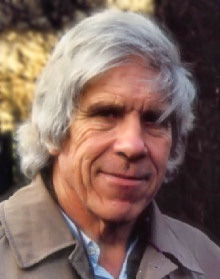An evolutionarily stable strategy (ESS) is a strategy that is impermeable when adopted by a population in adaptation to a specific environment, that is to say it cannot be displaced by an alternative strategy which may be novel or initially rare. Introduced by John Maynard Smith and George R. Price in 1972/3, it is an important concept in behavioural ecology, evolutionary psychology, mathematical game theory and economics, with applications in other fields such as anthropology, philosophy and political science.
Game theory is the study of mathematical models of strategic interactions among rational agents. It has applications in many fields of social science, used extensively in economics as well as in logic, systems science and computer science. Traditional game theory addressed two-person zero-sum games, in which a participant's gains or losses are exactly balanced by the losses and gains of the other participant. In the 21st century, game theory applies to a wider range of behavioral relations, and it is now an umbrella term for the science of logical decision making in humans, animals, as well as computers.

John Maynard Smith was a British theoretical and mathematical evolutionary biologist and geneticist. Originally an aeronautical engineer during the Second World War, he took a second degree in genetics under the well-known biologist J. B. S. Haldane. Maynard Smith was instrumental in the application of game theory to evolution with George R. Price, and theorised on other problems such as the evolution of sex and signalling theory.

Stephen Jay Gould was an American paleontologist, evolutionary biologist, and historian of science. He was one of the most influential and widely read authors of popular science of his generation. Gould spent most of his career teaching at Harvard University and working at the American Museum of Natural History in New York. In 1996, Gould was hired as the Vincent Astor Visiting Research Professor of Biology at New York University, after which he divided his time teaching between there and Harvard.

William Donald Hamilton was a British evolutionary biologist, recognised as one of the most significant evolutionary theorists of the 20th century.
Evolutionary economics is a school of economic thought that is inspired by evolutionary biology. Although not defined by a strict set of principles and uniting various approaches, it treats economic development as a process rather than an equilibrium and emphasizes change, innovation, complex interdependencies, self-evolving systems, and limited rationality as the drivers of economic evolution. The support for the evolutionary approach to economics in recent decades seems to have initially emerged as a criticism of the mainstream neoclassical economics, but by the beginning of the 21st century it had become part of the economic mainstream itself.

The handicap principle is a hypothesis proposed by the Israeli biologist Amotz Zahavi to explain how evolution may lead to "honest" or reliable signalling between animals which have an obvious motivation to bluff or deceive each other.
The game of chicken, also known as the hawk-dove game or snowdrift game, is a model of conflict for two players in game theory. The principle of the game is that while the ideal outcome is for one player to yield, individuals try to avoid it out of pride, not wanting to look like "chickens." Each player taunts the other to increase the risk of shame in yielding. However, when one player yields, the conflict is avoided, and the game essentially ends.
Evolutionary game theory (EGT) is the application of game theory to evolving populations in biology. It defines a framework of contests, strategies, and analytics into which Darwinian competition can be modelled. It originated in 1973 with John Maynard Smith and George R. Price's formalisation of contests, analysed as strategies, and the mathematical criteria that can be used to predict the results of competing strategies.
Professor Geoffrey Alan Parker FRS is an emeritus professor of biology at the University of Liverpool and the 2008 recipient of the Darwin Medal. Parker has been called “the professional’s professional”.

Within evolutionary biology, signalling theory is a body of theoretical work examining communication between individuals, both within species and across species. The central question is when organisms with conflicting interests, such as in sexual selection, should be expected to provide honest signals rather than cheating. Mathematical models describe how signalling can contribute to an evolutionarily stable strategy.
Adaptationism is the Darwinian view that many physical and psychological traits of organisms are evolved adaptations. Pan-adaptationism is the strong form of this, deriving from the early 20th century modern synthesis, that all traits are adaptations, a view now shared by only a few biologists.
The gene-centered view of evolution, gene's eye view, gene selection theory, or selfish gene theory holds that adaptive evolution occurs through the differential survival of competing genes, increasing the allele frequency of those alleles whose phenotypic trait effects successfully promote their own propagation. The proponents of this viewpoint argue that, since heritable information is passed from generation to generation almost exclusively by DNA, natural selection and evolution are best considered from the perspective of genes.
In biology, the idea of an unbeatable strategy was proposed by W.D. Hamilton in his 1967 paper on sex ratios in Science. In this paper Hamilton discusses sex ratios as strategies in a game, and cites Verner as using this language in his 1965 paper which "claims to show that, given factors causing fluctuations of the population's primary sex ratio, a 1:1 sex-ratio production proves the best overall genotypic strategy".
A population can be described as being in an evolutionarily stable state when that population's "genetic composition is restored by selection after a disturbance, provided the disturbance is not too large". This population as a whole can be either monomorphic or polymorphic. This is now referred to as convergent stability.
In game theory an uncorrelated asymmetry is an arbitrary asymmetry in a game which is otherwise symmetrical. The name 'uncorrelated asymmetry' is due to John Maynard Smith who called payoff relevant asymmetries in games with similar roles for each player 'correlated asymmetries'.
The Bishop–Cannings theorem is a theorem in evolutionary game theory. It states that (i) all members of a mixed evolutionarily stable strategy (ESS) have the same payoff, and (ii) that none of these can also be a pure ESS. The usefulness of the results comes from the fact that they can be used to directly find ESSes algebraically, rather than simulating the game and solving it by iteration.
In game theory, the war of attrition is a dynamic timing game in which players choose a time to stop, and fundamentally trade off the strategic gains from outlasting other players and the real costs expended with the passage of time. Its precise opposite is the pre-emption game, in which players elect a time to stop, and fundamentally trade off the strategic costs from outlasting other players and the real gains occasioned by the passage of time. The model was originally formulated by John Maynard Smith; a mixed evolutionarily stable strategy (ESS) was determined by Bishop & Cannings. An example is a second price all-pay auction, in which the prize goes to the player with the highest bid and each player pays the loser's low bid.

Kenneth George "Ken" Binmore, is an English mathematician, economist, and game theorist, a Professor Emeritus of Economics at University College London (UCL) and a Visiting Emeritus Professor of Economics at the University of Bristol. As a founder of modern economic theory of bargaining, he made important contributions to the foundations of game theory, experimental economics, evolutionary game theory and analytical philosophy. He took up economics after holding the Chair of Mathematics at the London School of Economics. The switch has put him at the forefront of developments in game theory. His other interests include political and moral philosophy, decision theory, and statistics. He has written over 100 scholarly papers and 14 books.
Reciprocal altruism in humans refers to an individual behavior that gives benefit conditionally upon receiving a returned benefit, which draws on the economic concept – ″gains in trade″. Human reciprocal altruism would include the following behaviors : helping patients, the wounded, and the others when they are in crisis; sharing food, implement, knowledge.






